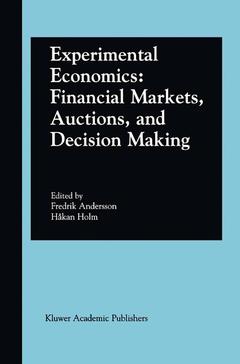Experimental Economics: Financial Markets, Auctions, and Decision Making, Softcover reprint of the original 1st ed. 2002 Interviews and Contributions from the 20th Arne Ryde Symposium
Coordonnateurs : Andersson Fredrik Nils, Holm Hakan

Experimental Economics: Financial Markets, Auctions, And Decision Making is based on research presented at the 20th Arne Ryde Symposium on Experimental Economics, held on November 9-11 at Lund University. The volume is divided into two parts.
In Part I, interviews with prominent researchers in the field, all invited speakers at the Symposium, are presented. Those interviewed are Peter Bohm, Catherine Eckel, Werner Güth, John Hey, Daniel Kahneman, Alvin Roth, Vernon Smith, and Martin Weber. The interviews address important questions about basic experimental methods and the interpretation of results. In addition, these researchers answer questions relating to their specific fields and to their contributions at the Symposium. They are also asked to single out the most important findings in the field.
Part II contains selected contributions from the conference. Topics covered include attitudes towards risk and inequality; pitfalls in experimental economics; analysis of trading-period duration; robustness in learning; video experiments on decision making and fairness; sequential prisoners' dilemmas; and collusion in auctions.
Date de parution : 11-2012
Ouvrage de 248 p.
15.5x23.5 cm
Disponible chez l'éditeur (délai d'approvisionnement : 15 jours).
Prix indicatif 105,49 €
Ajouter au panierDate de parution : 04-2002
Ouvrage de 248 p.
15.5x23.5 cm



